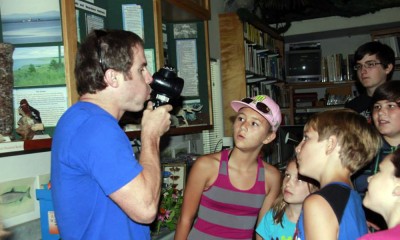
School Programs
The Dungeness River Audubon Center’s education focus for elementary and middle school children is from second through eighth grades. Thanks to a series of environmental education grants, Center staff has developed curriculum for elementary and middle schools that focus on the wildlife of the Dungeness watershed and how humans affect local watersheds over time. These programs include:
5th Grade: Watershed Monitoring. During these trips, students use the scientific method and widely used field techniques to answer the question, “Is the Dungeness River in Railroad Bridge Park healthy for salmon?” Each class participates in a 1-hour classroom visit and a 2-hour field trip to the Dungeness River at Railroad Bridge Park, where they conduct four experiments to collect data that indicate the river’s health:
1) making observations and documenting the River with photographs,
2) measuring temperature and dissolved oxygen,
3) conducting a cobble survey,
4) collecting, identifying, and counting aquatic macroinvertebrates.
Students use the data they collect in the field to make a conclusion about the health of the Dungeness River at Railroad Bridge Park.
6th Grade: Park Stewardship Field Trips. During late May and early June, all 6th graders from Sequim Middle School participate in field trips to Railroad Bridge Park, where they participate in seven different activities exploring park stewardship and management of the river, such as understanding the flora and fauna of Railroad Bridge Park, discovering river systems, discovering habitat succession, and taking part in noxious weed removal in the river’s flood plain. Sequim High School AP Biology students assist with teaching and mentoring 6th grade students.
7th Grade: Living in the Shadow. In the fall, Sequim Middle School 7th grade students visit the Jamestown S’Klallam Tribe campus where River Center and tribal staff guide students through the historical use of natural resources, beginning 14,000 years ago when humans first settled here. Students discover human uses of the Olympic Peninsula’s natural resources by participating in an archaeological dig and deciding how to use resources during a game of survival. Students are also encouraged to uncover native art during a visit to the tribe’s carving shed. Unlike other programs offered by the River Center, this program focuses strongly on Language Arts and Social Studies.
8th Grade: Watershed Weeks. During early May, Sequim Middle School 8th grade science students investigate the Dungeness watershed through four experiences, all related to increasing public awareness about bacterial contamination of Dungeness Bay. Students map watersheds and discover the importance of preserving bird stopover habitat, become experts on shellfish health, gather data on riparian forest health, and learn about the importance and influence of septic tanks in our area. For a conclusion the students create a river and discuss the influence of development on their watershed.
High School and College: Independent research and 6th Grade (see above). Through donated endowments, Olympic Peninsula Audubon Society and the River Center Foundation provide internship programs to complete independent projects in environmental studies. High school students also have the option to complete Natural Resource credit through the Lincoln Skills Center in Port Angeles through interships or independent projects.

